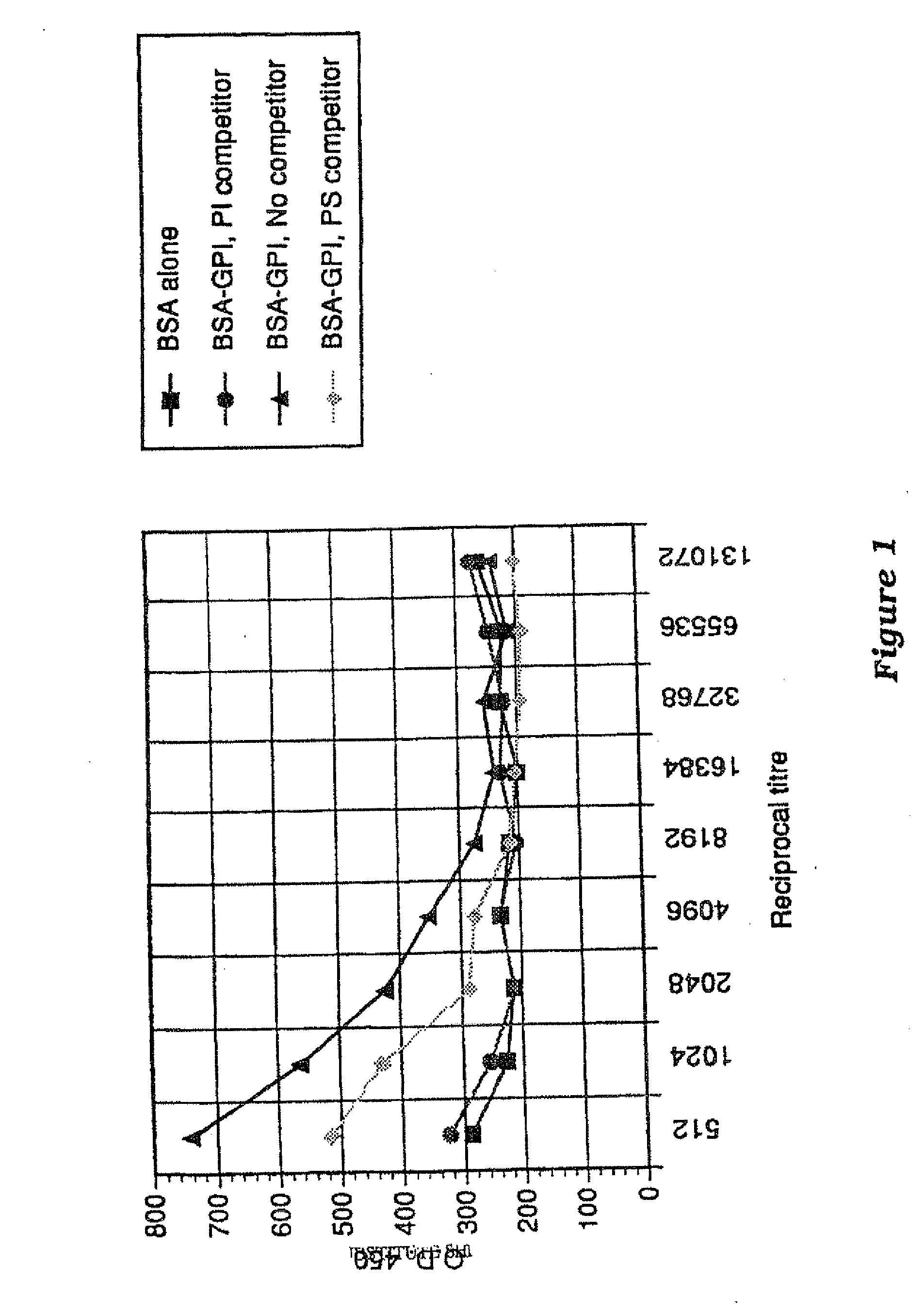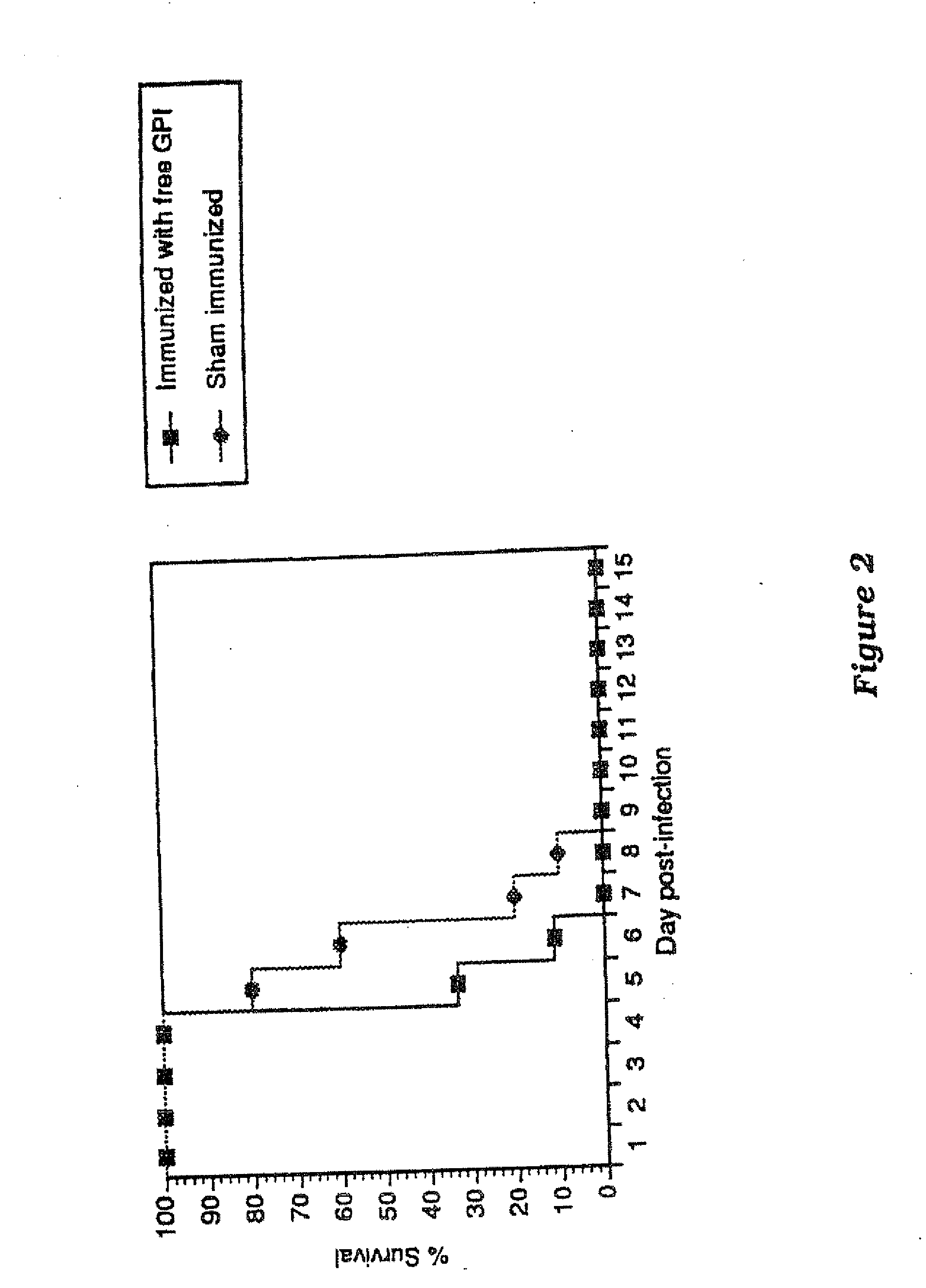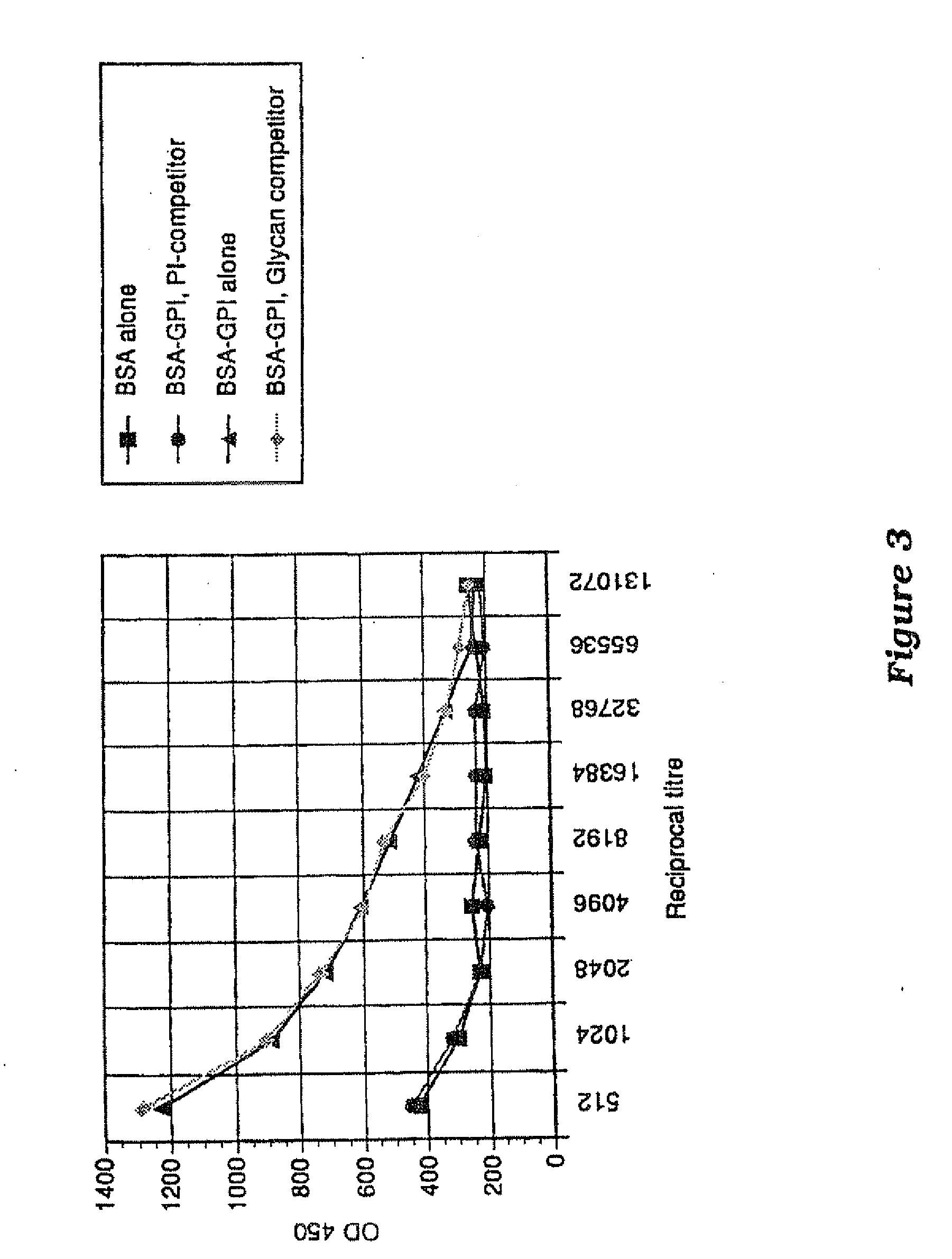Immunogenic compositions and uses thereof
a technology of immunomodulatory compositions and compositions, applied in the field of immunomodulatory compositions, can solve the problems of affecting socioeconomic development, serious mortality and morbidity of sensitive populations, etc., and achieve the effect of inhibiting, halting or delaying the onset or progression
- Summary
- Abstract
- Description
- Claims
- Application Information
AI Technical Summary
Benefits of technology
Problems solved by technology
Method used
Image
Examples
example 1
Reagents, Animals and Preparation of Parasites
[0225]Pronase was obtained from Boehringer Mannheim. Phosphatidylinositol-specific phospholipase C was from Calbiochem. Octyl-Sepharose, Protein-G Sepharose, n-octylthioglucopyranoside (n-otg), phenylmethylsulfonylfluoride (PMSF), p-tosyl-L-lysine-chloromethylketone (TLCK), N-tosyl-L-phenylalaninechloromethylketone (TPCK), p-chloro-mercuriphenylsulphonic acid (p-CMPS), aprotinin, leupeptin, pepstatin, iodoacetamide, n-ethyl-maleimide (NEM), and Concanavalin-A were obtained from Sigma Chemical Co. Sephadex was from Pharmacia. Biogel P4 was from Biorad. Analytical or HPLC grade, acetic acid, butanol, chloroform, diethyl ether, ethanol, methanol and water were obtained from BDH and Waters. Silica G60 TLC plates were from Merck Darmstadt. Tritiated mannose, glucosamine, myristic and palmitic acids were from Amersham.
[0226]Adult female C57BL / 6 and C3H / HeJ mice were bred and maintained in the Walter and Eliza Hall Institute specific pathogen f...
example 2
Purification of the 195KD MSP-1 and 56KD MSP-2 Antigens
[0228]The GPI-anchored MSP-1 and MSP-2 merozoite surface proteins were purified to homogeneity as described previously (Schofield and Hackett, 1993), Biosynthetically labelled malaria parasites at the late schizont stage were lysed in 0.05% Saponin and centrifuged at 15,000 g for 20 minutes, and washed as above. The pellet was extracted in 25 mM n-octyl-thioglucopyranoside (n-otg), 1% BSA, 1 mM EDTA, 0.1 mM EGTA, 1 mM PMSF, 1 mM TPCK, 0.1 mM TLCK, 5 mM pCMPS, 1 μg / ml pepstatin, 1 μg / ml leupeptin, 1 mM NEM, 5 mM iodoacetamide, 150 mM NaCl, 25 mM Tris / HCl pH 7.4 by sonication on ice. The extact was clarified by centrifugation at 20,000 g for 30 minutes in the cold, and the supernatant decanted and loaded onto two immunoaffinity columns arranged in sequence, containing approximately 10 mg monoclonal antibody 111.4 or monoclonal antibody 113.1, each cross-linked to Protein G-Sepharose by gluteraldehyde (all procedures on ice). The p...
example 3
Purification of the C-Terminal GPI Anchors of Defined Parasite Antigens
[0230]To purify the intact C-terminal GPIs free of detergent, non-covalently bound lipids, glycolipids, phospholipids and protein or peptide fragments, affinity purified MSP-1 and MSP-2 were first scrubbed with organic solvents. 10 mg / ml GPI-anchored proteins were placed in 150 μl aliquots in clean glass tubes. 600 μl MeOH was added and vortexed, followed by 150 μl 1 Chloroform and 450 μl water and further vortexing. The samples were centrifuged at 14000 rpm for 3 min, the supernatant discarded, and the interphase and lower phase mixed with 450 μl MeOH and re-centrifuged at 14000 rpm for 3 min. The protein pellet was extracted 5 times with C / M / W 10:10:3, and finally extracted with acetone over night at −20° C. The acetone was removed completely and the proteins taken up with sonication in 6M Urea, 1 mM DTT, 1 mM iodoacetic acid. After 15 minutes at room temperature, the sample was diluted 6 fold and made to 5 mM ...
PUM
| Property | Measurement | Unit |
|---|---|---|
| molar ratio | aaaaa | aaaaa |
| flow rate | aaaaa | aaaaa |
| size- | aaaaa | aaaaa |
Abstract
Description
Claims
Application Information
 Login to View More
Login to View More - R&D
- Intellectual Property
- Life Sciences
- Materials
- Tech Scout
- Unparalleled Data Quality
- Higher Quality Content
- 60% Fewer Hallucinations
Browse by: Latest US Patents, China's latest patents, Technical Efficacy Thesaurus, Application Domain, Technology Topic, Popular Technical Reports.
© 2025 PatSnap. All rights reserved.Legal|Privacy policy|Modern Slavery Act Transparency Statement|Sitemap|About US| Contact US: help@patsnap.com



